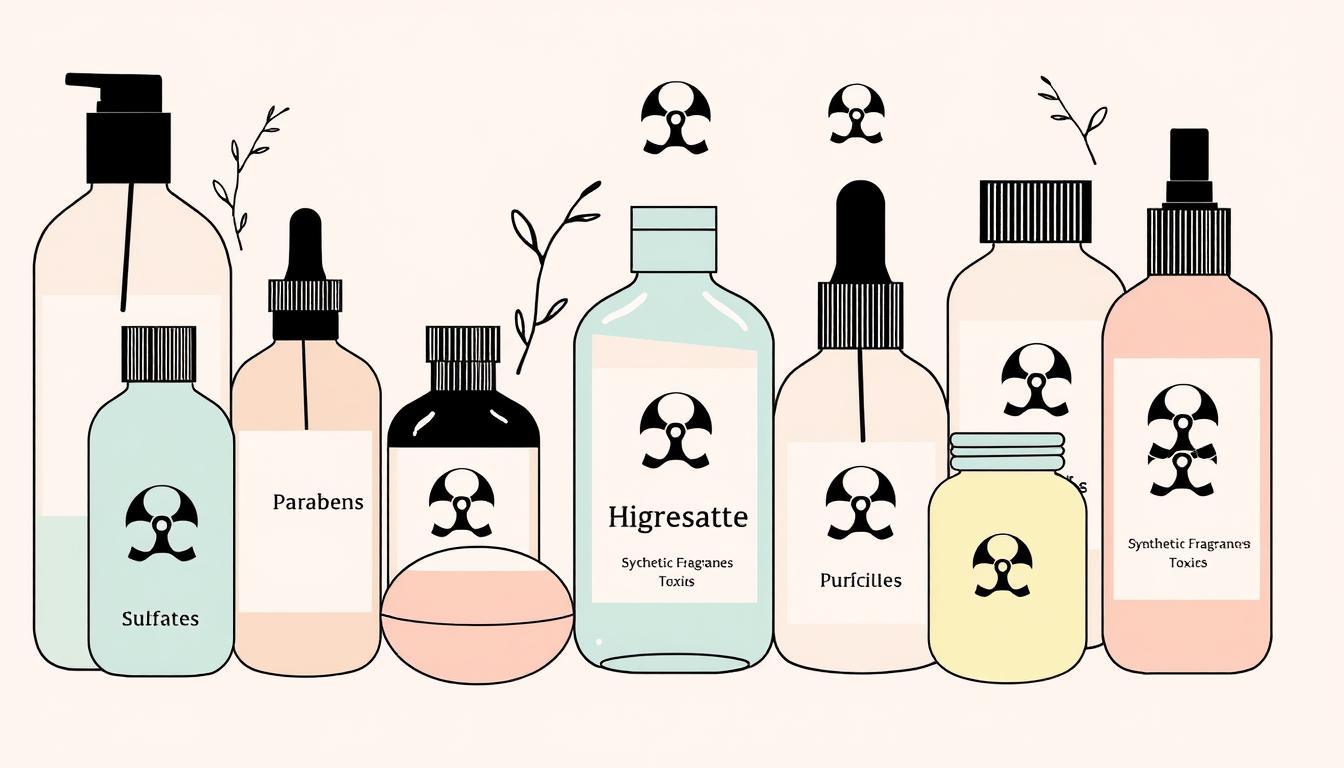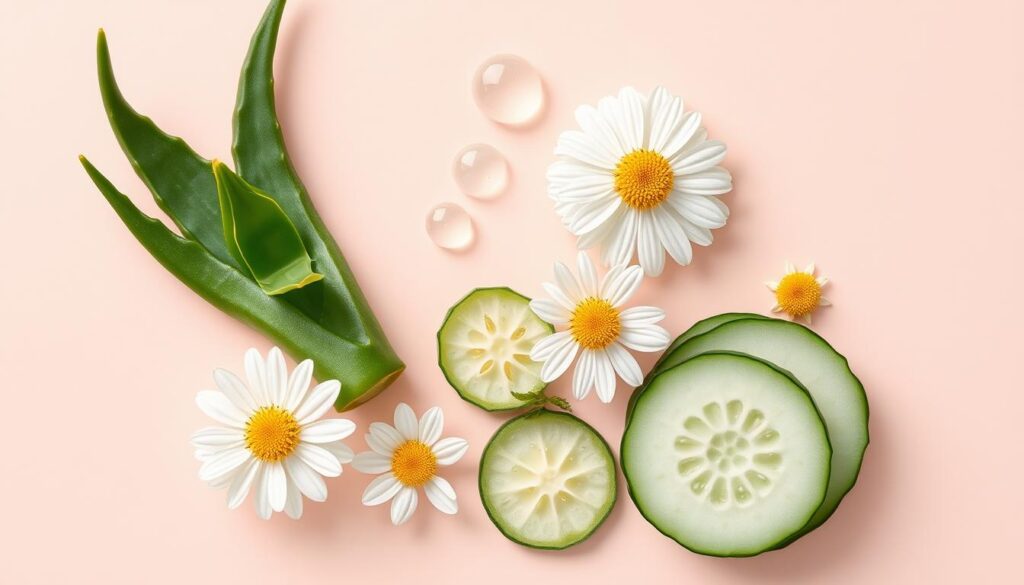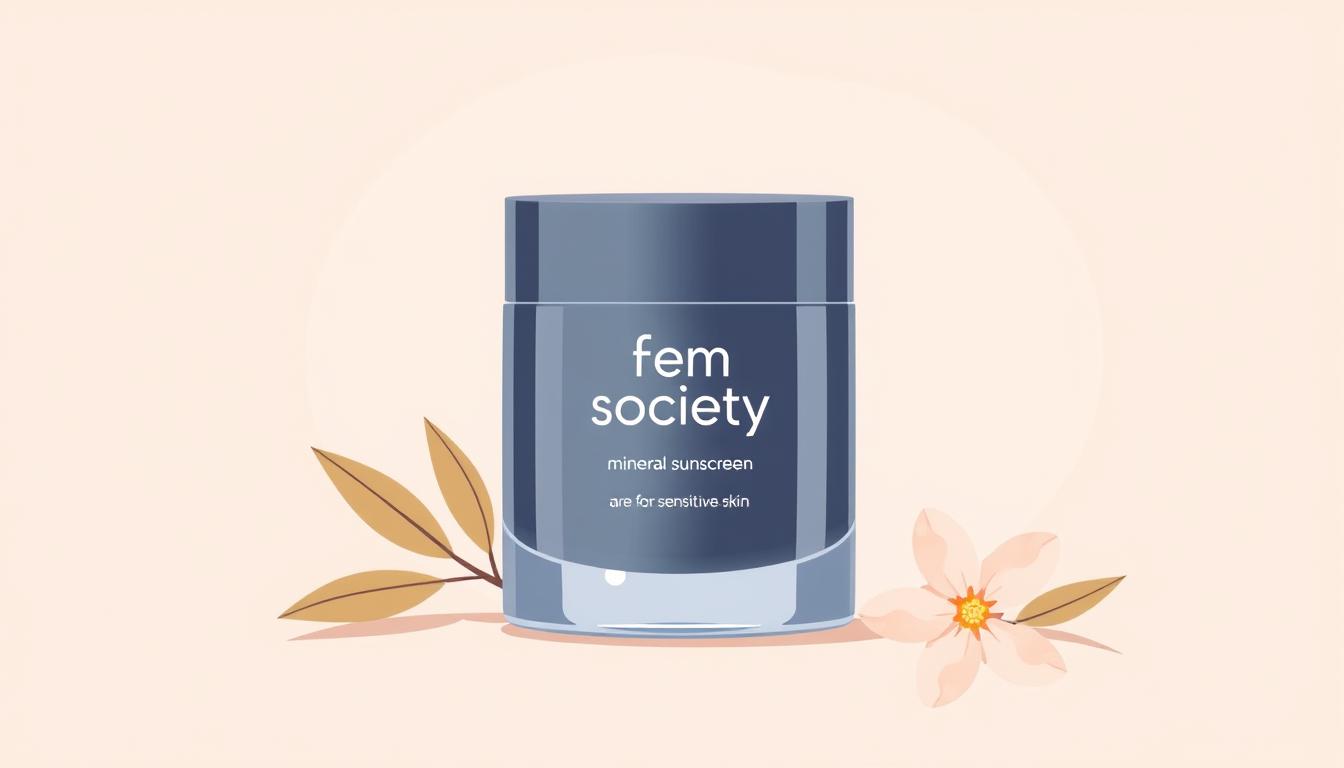About 70% of people say they have sensitive skin. This means their skin reacts a lot to different things. It can get red, irritated, and more.
This guide will help you take care of your sensitive skin. We’ll cover what causes it and how to make a good skincare plan.
Key Takeaways
- Sensitive skin is a common condition affecting a large percentage of the population.
- Sensitivity can manifest through symptoms like redness, irritation, and reactions to certain products or environmental factors.
- Maintaining a gentle, carefully curated skincare routine is crucial for managing sensitive skin.
- Identifying and avoiding potential triggers is key to preventing flare-ups and maintaining a healthy complexion.
- Incorporating gentle, nourishing ingredients can help strengthen the skin’s barrier and reduce sensitivity over time.
Understanding Sensitive Skin: Signs and Symptoms

Do you have sensitive skin? You’re not alone. About 70% of people say they have sensitive skin. They react to certain things all the time. Knowing what sensitive skin looks like is the first step to making it better.
Common Indicators of Skin Sensitivity
Symptoms of sensitive skin include tingling, stinging, and burning. You might also feel intense itching. This happens because your skin barrier is weak. It lets irritants get in and cause trouble.
Difference Between Sensitive and Irritated Skin
It’s key to know the difference between sensitive and irritated skin. Sensitive skin reacts easily. Irritated skin happens to anyone, from harsh products to weather changes. Using gentle, hypoallergenic products is best for sensitive skin.
Factors Affecting Skin Sensitivity
Many things can make your skin sensitive. Genetics, hormones, diet, and weather can all play a part. Knowing what makes your skin react is important for keeping it healthy.
“Limiting the number of skincare products used can help prevent triggering symptoms in sensitive skin.”
| Sensitive Skin Symptoms | Causes of Skin Sensitivity |
|---|---|
|
|
The Science Behind Sensitive Skin Reactions

Sensitive skin often means the skin’s outer layer is weak. This makes it easy for irritants to get in. This can cause dryness, redness, and swelling. Knowing how this happens helps us find better ways to care for sensitive skin.
About 60% to 70% of women and 50% to 60% of men have sensitive skin. This has led to more products for sensitive skin, like those from Burt’s Bees. These products can make skin look better, reduce redness, and help the skin’s barrier.
Sensitive skin has a nervous system that’s always on and a barrier that’s not working right. This makes it react more to things. Things like pollution, some skincare, and lifestyle can make skin more sensitive. Tests can help figure out what irritates your skin.
Using ingredients like Asparagopsis Armata extract, Bisabolol, and Opuntia Ficus-Indica Fruit Extract can help. Eating foods rich in omega-3s and antioxidants can also help. Knowing about sensitive skin is the first step to a good skincare plan for sensitive skin.
“Around 70% of people across 18 countries reported having skin sensitivities, based on a meta-analysis by Chen et al., 2020.”
Identifying Your Skin’s Specific Triggers

Finding out what makes your skin sensitive can be hard. But knowing what triggers reactions is key to a healthy glow. Things like the environment, what’s in your products, and your lifestyle can affect your skin. Knowing what makes your skin sensitive is the first step to a better skincare routine.
Environmental Triggers
The world can really affect your skin. Pollution, extreme temperatures, and harsh weather can make your skin red and irritated. Paying attention to how your skin reacts to different places can help. Adjusting your skincare routine can also help fight these environmental issues.
Product-Related Triggers
What’s in your skincare and makeup can also cause problems. Fragrances, dyes, parabens, and harsh chemicals can dry out or irritate your skin. Using gentle, fragrance-free products and doing patch tests can help avoid these issues.
Lifestyle Factors
Your daily habits can also affect your skin. Stress, not enough sleep, and bad nutrition can weaken your skin. Taking care of yourself, sleeping well, and eating right can help keep your skin healthy and strong.
By tackling your skin’s specific issues, you can start on the path to a more confident, glowing complexion. Remember, everyone’s skin is different. Listen to your skin and adjust as needed to find what works best for you.
Essential Ingredients for Sensitive Skin Care

If you have sensitive skin, it’s key to watch what’s in your skincare. Some gentle, natural ingredients can really help. Look for these important parts in your routine:
- Aloe Vera – It calms and fights inflammation, making redness and irritation go down.
- Shea Butter – It’s a rich butter that deeply moisturizes and feeds your skin, making it stronger.
- Coconut Oil – This oil is gentle and helps fight off bad stuff, making it great for sensitive skin.
- Hyaluronic Acid – It pulls moisture into your skin, keeping it hydrated for a long time without clogging pores.
- Chamomile – It has anti-inflammatory and antioxidant properties, helping to calm redness and irritation.
- Sunflower Seed Oil – It’s full of good fats and vitamins, helping to make your skin’s barrier stronger.
- Vitamin E – It’s an antioxidant that soothes and protects your skin from the outside world.
Using these natural ingredients in your sensitive skincare can really help. They soothe, hydrate, and strengthen your skin. Always test new products on a small area first to make sure they’re okay for you.
“Treating sensitive skin requires a delicate, tailored approach to restore the skin’s protective barrier and reduce inflammation.”
Harmful Ingredients to Avoid

When you have sensitive skin, it’s important to watch what’s in your skincare. Some common things can make your skin upset. Let’s look at some skincare ingredients to avoid for sensitive skin.
Common Irritants in Skincare Products
- Sodium lauryl sulfates (SLS) and sodium laureth sulfates (SLES) – These harsh detergents can strip the skin’s natural oils, leading to dryness and irritation.
- Parabens – These preservatives have been linked to hormonal disruptions and are harmful skincare ingredients to steer clear of.
- Fragrances – Both synthetic and natural fragrances can trigger allergic reactions and sensitivities in many individuals.
- Essential oils – While natural, these potent plant-derived oils can be sensitizing for those with sensitive skin.
Hidden Ingredients That Can Cause Reactions
There are also some hidden skincare ingredients to avoid in your products. These include:
- Phthalates – Found in fragrances and nail polish, these chemicals can disrupt hormonal balance and reproductive health.
- Formaldehyde – Used as a preservative, formaldehyde has been linked to cancer and can irritate sensitive skin.
- Oxybenzone – This common sunscreen ingredient has been shown to have hormone-disrupting effects and may cause allergic reactions.
Always do a patch test before using new products on your sensitive skin. This helps avoid bad reactions. By knowing what to avoid, you can keep your skin healthy and glowing.
“Protecting your skin’s health starts with understanding the ingredients that can potentially cause harm.”
Skincare Routine for Women with Sensitive Skin

If you have sensitive skin, it’s key to watch what you do every day. A soft, easy sensitive skin routine can calm and guard your skin. Here are the basic steps for a gentle skincare regimen made just for your daily skincare for sensitive skin.
Cleanse Gently
Find a sensitive skin face wash without harsh stuff, smells, or irritants. Stay away from long, hot showers. Use lukewarm water instead. Massage the cleanser gently on your skin, then rinse well.
Soothe with Toner
Use a calm, alcohol-free toner to balance your skin’s pH. It gets ready for what comes next. Look for toners with rose water, green tea, or chamomile.
Moisturize Diligently
Moisturizing keeps your skin healthy. Choose sensitive skin moisturizers with good stuff like hyaluronic acid, shea butter, and ceramides.
Protect from the Sun
The sun can hurt sensitive skin. Use a mineral-based sunscreen with zinc oxide or titanium dioxide to protect.
Always test new products on a small area first. This makes sure they won’t hurt your skin. Start simple with a gentle skincare regimen. Add more steps as your skin gets used to them.
| Sensitive Skin Routine Step | Recommended Ingredients |
|---|---|
| Cleansing | Gentle, fragrance-free face wash |
| Toning | Alcohol-free toner with soothing botanicals |
| Moisturizing | Hyaluronic acid, shea butter, ceramides |
| Sun Protection | Mineral-based sunscreen with zinc oxide or titanium dioxide |
“Simplifying your skincare routine and using gentle, soothing products can make a significant difference for those with sensitive skin.”
Morning Skincare Steps for Sensitive Skin

Caring for sensitive skin in the morning is gentle and thoughtful. Start with a morning skincare routine that focuses on gentle face washing and sensitive skin cleansing. These steps nourish and protect your skin, making it radiant and healthy-looking.
Gentle Cleansing Techniques
Begin with lukewarm water and a gentle, fragrance-free cleanser. Don’t scrub hard, as it can upset your skin’s balance. Gently massage the cleanser with your fingertips in light, upward strokes. Rinse well with lukewarm water, being careful not to pull on your sensitive skin.
Proper Application Methods
After washing, apply your skincare products softly. Use your clean fingertips to press and pat them into your skin. This way, you avoid irritation and make sure your sensitive skin gets the care it needs.
Next, use a sensitive skin-friendly moisturizer and a broad-spectrum sunscreen with SPF 30 or higher. These steps protect your skin from the environment and keep it hydrated all day.
“The key to caring for sensitive skin is to use gentle, non-irritating products and techniques. Avoid harsh scrubbing or over-exfoliating, and focus on soothing, hydrating ingredients that will nourish and protect your delicate complexion.”
Evening Skincare Protocol

When the sun goes down, it’s time to change your skincare routine. This is for sensitive skin at night. It’s a chance to make your skin happy and fix it while you sleep.
Start by gently removing makeup and dirt with a nighttime skincare routine. Use a micellar water or a soft, creamy cleanser. This cleanses well without taking away your skin’s natural oils.
Then, use a calming toner or facial mist. This helps your skin’s pH balance and gets it ready for more steps. Look for evening skin care for sensitive skin with soothing stuff like rose water, aloe vera, or chamomile. These calm redness or irritation.
- Next, apply a nourishing night cream or facial oil made for sensitive skin. These overnight skin repair items deeply hydrate and support your skin’s barrier while you sleep.
- Think about adding a hydrating overnight mask to your routine once or twice a week. These masks give extra moisture. They make your skin feel fresh and awake in the morning.
For a good evening skincare routine for sensitive skin, keep it simple and gentle. With a bit of care, you’ll wake up with a glowing, balanced face. You’ll be ready for the day.
“Proper nighttime skincare is essential for sensitive skin types to repair and renew overnight.”
The Role of Hydration in Sensitive Skin Care

Keeping your skin hydrated is key for sensitive skin. If your skin’s moisture barrier is weak, it can get dry and irritated. Using hydrating ingredients helps keep your skin soft and calm.
Moisture Barrier Protection
The skin’s moisture barrier is very important. It keeps your skin safe from bad stuff outside. If it’s weak, your skin might get red, dry, and sore.
Use products with hyaluronic acid, ceramides, and glycerin to help. These ingredients keep moisture in and make your skin strong.
Hydrating Ingredients Guide
- Hyaluronic Acid: It pulls water into your skin, making it soft and wet.
- Ceramides: They fix your skin’s barrier, keeping moisture in and bad stuff out.
- Glycerin: It brings moisture into your skin, making it soft and smooth.
- Aloe Vera: It calms your skin and keeps it hydrated for a long time.
- Botanical Oils: Oils like jojoba, squalane, and rosehip strengthen your skin’s barrier and keep it from getting dry.
Adding these hydrating skincare ingredients to your routine helps keep your skin hydrated. It also makes your skin’s moisture barrier strong. This makes your sensitive skin healthier and more resilient.
Sun Protection Strategies for Sensitive Skin

Protecting your sensitive skin from the sun is very important. Use zinc oxide or titanium dioxide in your sunscreen. These are good for sensitive skin and work better than chemical sunscreens. Put on sunscreen every day, even on cloudy days. Reapply every two hours when you’re outside.
Here are some tips to keep your skin safe:
- Choose a mineral sunscreen with SPF 30 or higher to block UVA and UVB rays.
- Use a lot of sunscreen, about 1 ounce (a shot glass full) for your whole body.
- Reapply sunscreen every 2 hours, or more if you swim or sweat.
- Wear clothing, hats, and sunglasses to add extra protection.
- Stay in the shade when you can, especially from 10 AM to 4 PM.
Following these tips can help keep your sensitive skin safe. It can also prevent sunburn, early aging, and other skin problems.
| Ingredient | Benefit for Sensitive Skin |
|---|---|
| Zinc Oxide | Provides broad-spectrum UV protection without causing irritation. |
| Titanium Dioxide | Another mineral sunscreen ingredient that shields sensitive skin from harmful sun rays. |
| Shea Butter | Rich in vitamins A, E, and F, shea butter helps nourish and soothe dry, sensitive skin. |
| Evening Primrose Oil | Protects the skin’s natural moisture barrier, making it suitable for sensitive skin types. |
By focusing on sun protection and using the right ingredients, you can enjoy the outdoors. Your sensitive skin will stay healthy and look great.
Natural Remedies and DIY Solutions

If you have sensitive skin, trying new products can be scary. But, there are gentle, soothing natural remedies and DIY solutions. Oatmeal baths and honey masks can change your skin’s game.
Aloe vera gel is great for sensitive skin. It cools and fights inflammation. Just put a thin layer on your skin and let it soak in.
- Oatmeal baths are also super good for sensitive skin. Oats soothe and reduce inflammation.
- Honey is another natural choice. It’s antibacterial and moisturizing, good for sensitive skin.
When trying DIY solutions, always test them first. Talk to a dermatologist if your skin is very sensitive. Natural skincare can be rewarding, but be careful.
| Natural Ingredient | Benefits for Sensitive Skin |
|---|---|
| Aloe Vera Gel | Calms redness and irritation |
| Oatmeal | Soothes inflammation and hydrates |
| Honey | Antibacterial and moisturizing properties |
| Lavender Oil | Anti-inflammatory and antioxidant effects |
| Coconut Oil | Nourishing and balancing for the skin |
Remember, natural skincare and DIY sensitive skin treatments can really help. But, always be careful. If you’re worried, talk to a pro about your home remedies for sensitive skin.
Seasonal Skincare Adjustments
Changing your skincare routine with the seasons is key for healthy skin. In winter, the air gets drier, making skin more sensitive and dry. Use hydrating products to keep your skin moist and protect it from cold winds.
Winter Care Tips
Use rich, creamy moisturizers with hyaluronic acid to keep moisture in. Add a nourishing serum, like Tensage Daily Serum, for better skin tone and UV protection. A humidifier can also help keep your indoor air moist.
Summer Protection Methods
In spring and summer, your skin might get oilier, causing clogged pores. Use light, oil-free moisturizers and serums with antioxidants, like Tensage Daily Serum, to brighten and protect your skin. Always wear sunscreen, even on cloudy days, to avoid sun damage and skin cancer.
FAQ
What are the common symptoms of sensitive skin?
Sensitive skin can feel tingling, stinging, or burning. It might itch a lot. This skin reacts too much to some things.
What are the factors that affect skin sensitivity?
Skin sensitivity can come from your genes or hormones. Diet and weather changes matter too. Some skincare products can also cause problems.
How is sensitive skin different from irritated skin?
Sensitive skin has a weak outer layer. This lets irritants get in and cause more problems. Irritated skin can happen to anyone from outside factors.
What are the common triggers for sensitive skin?
Things like fragrances and dyes in products can upset sensitive skin. So can pollution and stress. Lack of sleep and bad diet also play a part.
What ingredients are beneficial for sensitive skin?
Aloe vera and shea butter are good for sensitive skin. So are coconut oil and hyaluronic acid. They help calm and protect the skin.
What ingredients should be avoided for sensitive skin?
Stay away from sodium lauryl sulfates and petrochemicals. Parabens, phthalates, and synthetic dyes are bad too. Always test new products first.
What should a basic skincare routine for sensitive skin include?
Start with gentle cleansing and toning. Use a moisturizer and protect from the sun. Introduce new products slowly to avoid irritation.
How should you properly cleanse sensitive skin?
Clean your face with lukewarm water and a gentle cleanser. Use your fingertips in light, upward strokes. Don’t rub or tug.
What should a nighttime skincare routine for sensitive skin include?
Remove makeup gently and cleanse your face. Use a calming toner or mist. Then apply a night cream or oil for sensitive skin. Use a hydrating mask once a week.
How important is hydration for sensitive skin?
Keeping your skin hydrated is key. Use moisturizers with hyaluronic acid, ceramides, and glycerin. They help keep moisture in and protect your skin.
What type of sun protection is best for sensitive skin?
Choose mineral sunscreens with zinc oxide or titanium dioxide. They’re less likely to irritate your skin. Apply sunscreen every day and reapply every two hours in the sun.
What natural remedies can help soothe sensitive skin?
Oatmeal baths, aloe vera gel, and honey masks can help. But always test them first. If you have very sensitive skin, talk to a dermatologist before trying new things.
How should you adjust your skincare routine for different seasons?
Change your skincare with the seasons. In winter, use more moisturizer and protect from wind. In summer, use sun protection and light moisturizers. Always watch how the weather affects your skin.
